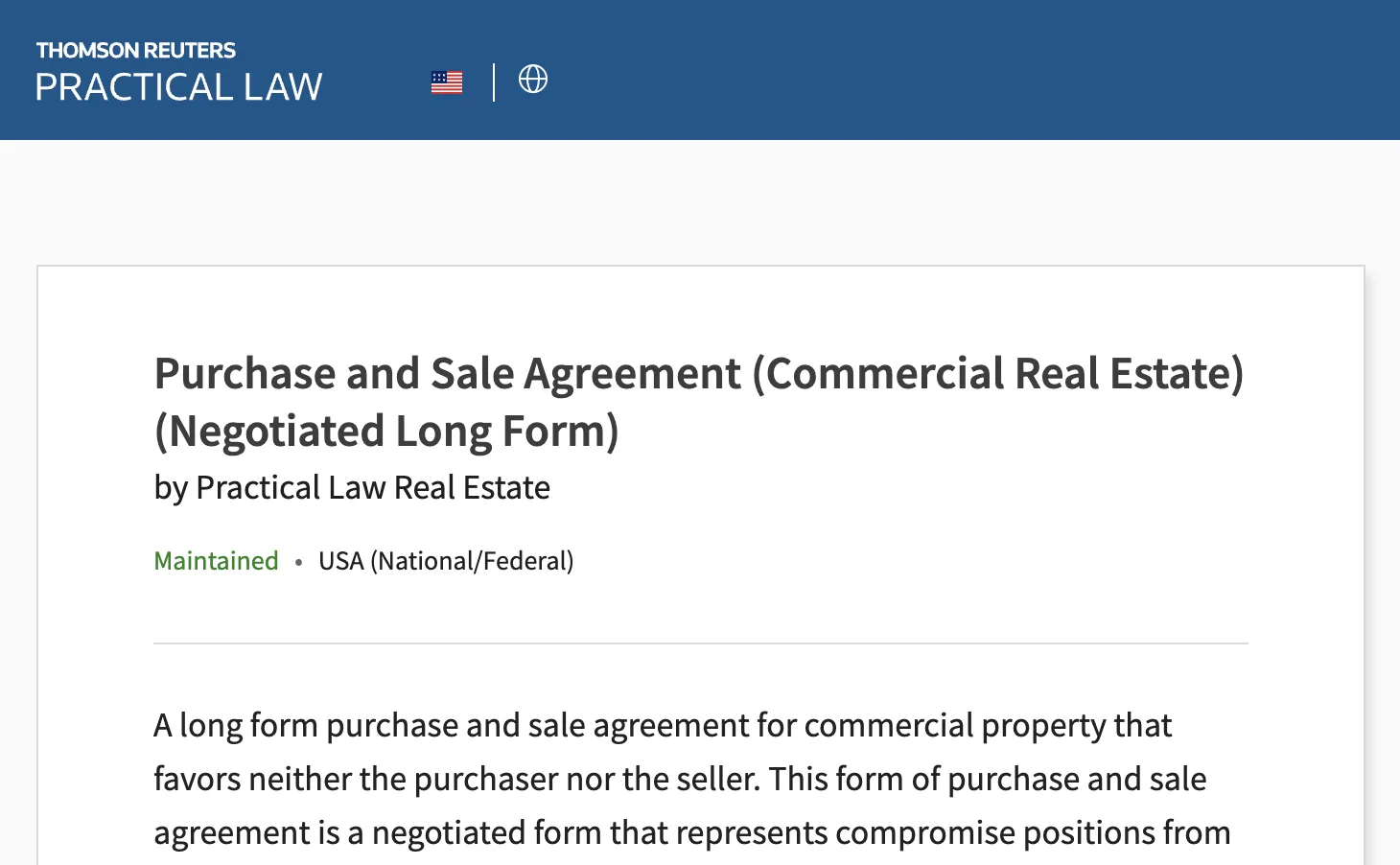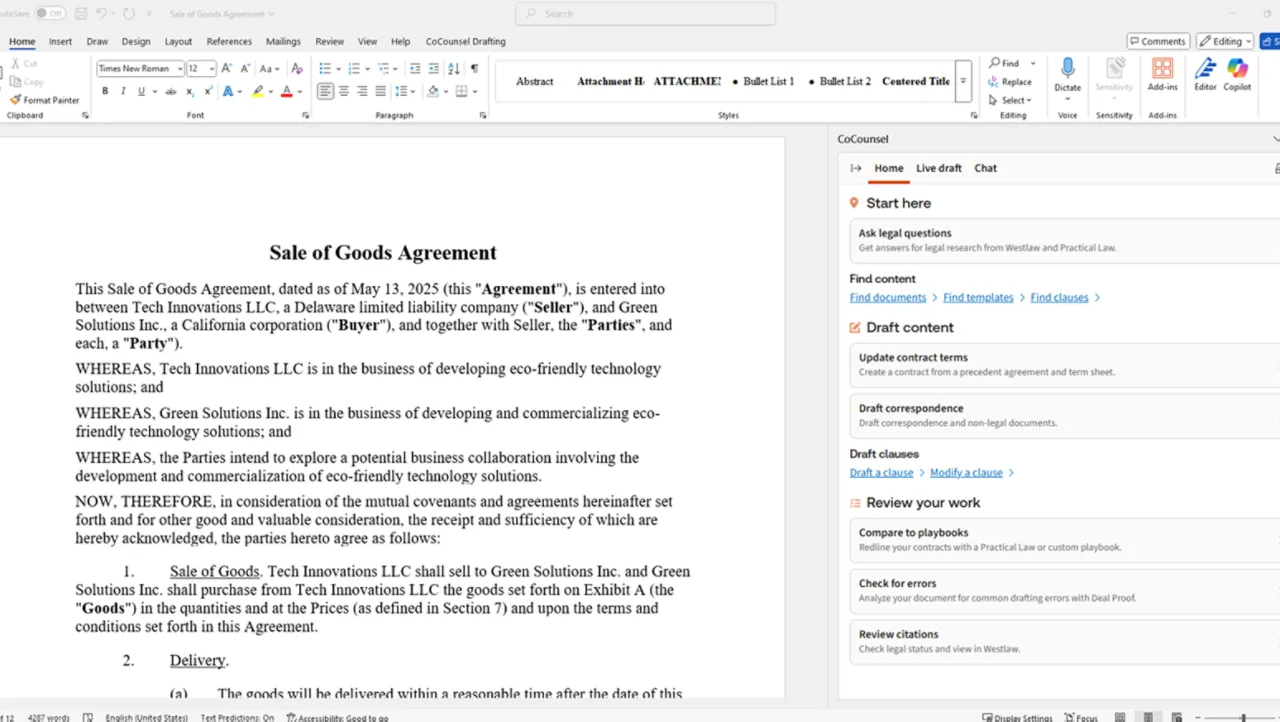Purchase agreement overview and templates for legal professionals
Highlights
- A purchase agreement is a foundational, legally binding contract that establishes the terms of a sale, crucial for protecting all parties and preventing disputes across various legal domains.
- These agreements are specifically adapted for different practice areas and are governed by distinct legal frameworks.
- The lifecycle of a purchase agreement involves meticulous drafting, due diligence, and negotiation, followed by essential post-agreement actions such as execution, closing, filing required documents, and monitoring compliance.
A purchase agreement, also known as a sales contract or purchase contract, is a legally binding document that outlines the terms and conditions of a sale between a buyer and a seller.
Navigating the complexities of purchase agreements is crucial in various practice areas, including commercial contracts, capital markets, mergers and acquisitions (M&A), and real estate. A well-drafted purchase agreement is essential to ensure a smooth transaction, protect the interests of all parties involved, and prevent potential disputes.
Jump to ↓
Commercial contracts
Mergers and Acquisitions (M&A)
Drafting and reviewing purchase agreements

Practical Law Standard Document
This Standard Document has integrated notes with important explanations and drafting and negotiating tips for both purchasers and sellers.
Access with free trial ↗Commercial contracts
In commercial contracts, purchase agreements are used to outline the terms and conditions of a sale, including the price, payment terms, and delivery details. These agreements are commonly used in business-to-business transactions, such as the purchase of goods or services.
According to the Uniform Commercial Code (UCC), a purchase agreement must include certain essential elements, including an offer and acceptance. (UCC §§ 2-204, 2-206).
The UCC is a comprehensive set of laws that govern commercial transactions, and its provisions can be found at the American Law Institute.
Capital Markets
In capital markets, purchase agreements are used in securities transactions, such as the issuance of stocks, bonds, or other financial instruments. These agreements outline the terms and conditions of the sale, including the price, payment terms, and any applicable securities laws or regulations.
The Securities and Exchange Commission (SEC) regulates securities transactions and provides guidance on the use of purchase agreements in capital markets (SEC Rule 144A).
For stock purchase templates with integrated notes, see:
- Stock Purchase Agreement (Pro-Buyer Long Form)
- Stock Purchase Agreement (Pro-Seller Long Form)
- Stock Purchase Agreement (Pro-Buyer Short Form)
- Stock Purchase Agreement (Pro-Seller Short Form)
Mergers and Acquisitions (M&A)
In M&A, purchase agreements are used to facilitate the acquisition of a company or its assets. These agreements outline the terms and conditions of the sale, including the purchase price, payment terms, and any applicable closing conditions.
According to Delaware law, Del. Code Ann. tit. 8, § 251, which is commonly used in M&A transactions, a purchase agreement requires board and stockholder approval and sets out key terms such as:
- the manner of carrying out the merger
- amendments to the certificate of incorporation
- the conversion or exchange of shares, and
- the consideration to be received
In practice, purchase agreements also address details like the description of assets, the purchase price, and representations and warranties.
For asset purchase templates with integrated notes, see:
- Asset Purchase Agreement (Pro-Buyer Long Form)
- Asset Purchase Agreement (Pro-Seller Long Form)
- Asset Purchase Agreement (Pro-Buyer Short Form)
- Asset Purchase Agreement (Pro-Seller Short Form)
Real Estate
In real estate, purchase agreements are used to outline the terms and conditions of a property sale, including the purchase price, payment terms, and any applicable contingencies. These agreements are commonly used in residential and commercial property transactions.
Purchase agreements are subject to state-specific laws and regulations. For example, the California Association of Realtors provides a standard form purchase agreement that outlines the terms and conditions of a residential real estate sale.
According to the National Association of Realtors, a purchase agreement must include certain essential elements, including a description of the property, the purchase price, and any applicable financing terms.
The National Association of Realtors provides guidance on real estate transactions, including sample purchase agreements.
For commercial real estate templates with integrated notes, see:
- Purchase and Sale Agreement (Commercial Real Estate) (Pro-Purchaser Long Form)
- Purchase and Sale Agreement (Commercial Real Estate) (Pro-Purchaser Short Form)
- Purchase and Sale Agreement (Commercial Real Estate) (Pro-Seller Long Form)
- Purchase and Sale Agreement (Commercial Real Estate) (Pro-Seller Short Form)
- Purchase and Sale Agreement (Commercial Real Estate) (Negotiated Long Form)
- Purchase and Sale Agreement (Commercial Real Estate, Vacant Land)
- Letter of Intent (Commercial Real Estate Purchase and Sale)
For commercial real estate practice notes, see:
- Purchase and Sale Agreements (Commercial Real Estate): Key Provisions
- Drafting and Negotiating Letters of Intent (Commercial Real Estate Purchase and Sale)
- Representations and Warranties in Commercial Real Estate Purchase and Sale Agreements
Drafting and reviewing purchase agreements
When drafting or reviewing a purchase agreement, it is essential to consider the following facts and steps:
- Define the scope of the agreement: Clearly outline the terms and conditions of the sale, including the price, payment terms, and any applicable contingencies.
- Identify the parties involved: Include the names and contact information of all parties involved in the transaction.
- Determine the applicable laws and regulations: Consider the relevant laws and regulations governing the transaction, including the UCC, SEC rules, Delaware law, or real estate laws.
- Conduct due diligence: Verify the accuracy of any representations and warranties made in the agreement.
- Negotiate and finalize the agreement: Work with the parties involved to negotiate and finalize the terms of the agreement.
After drafting or reviewing a purchase agreement, the typical next logical steps include:
- Executing the agreement: Sign the agreement and ensure that all parties have acknowledged and accepted the terms.
- Conducting closing: Complete any applicable closing conditions, such as payment of the purchase price or transfer of ownership.
- Filing necessary documents: File any necessary documents, such as securities filings or real estate recordings, to complete the transaction.
- Monitoring compliance: Ensure that all parties comply with the terms of the agreement and any applicable laws or regulations.
Purchase agreements are a crucial component of commercial contracts, capital markets, M&A, and real estate transactions. By understanding the legal contexts and essential facts of these agreements, attorneys can provide effective guidance to their clients and ensure a smooth transaction.

CoCounsel Legal
AI, trusted content, and expert insights from Westlaw and Practical Law to draft purchase agreements
Cut drafting in half ↗Related resources
For further research, attorneys can consult Practical Law content including standard documents for various purchase agreements.
What is Practical Law?
Practical Law is the most trusted and award-winning legal know-how provider. Resources include standard documents, checklists, legal updates, how-to-guides, and more.

92% of customers agree Practical Law helps them get up to speed and practice more efficiently
Over 650 full-time experienced attorney editors globally keeping you up to date
118,000+ total resources across 17 practice areas ensuring comprehensive coverage
134,000+ hours spent in 2024 maintaining and updating resources








